Welsh Water downgraded over sewage pollution by Natural Resources Wales
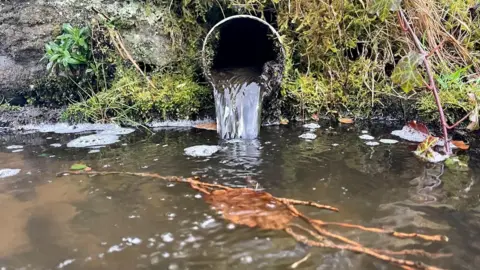 BBC
BBCWales' largest water company has been downgraded for the second year running after a rise in pollution incidents.
Welsh Water caused 89 sewage pollution incidents in 2022, five of which were classed as "having a high or significant impact".
Natural Resources Wales (NRW) reduced the company's rating of three stars to two stars, meaning it "requires improvement".
Welsh Water said its "performance is not where we want it to be".
Hywel Morgan, a world fly-casting champion, called the company a "disgrace".
"They don't even deserve one star," he said. "There's not one river in Wales that's fit to swim in.
"We as fishermen report pollution on a weekly basis and nothing is done about it," he added.
A year ago Welsh Water was downgraded from a industry leading four-star rating, to a "good company" rating of three star, following NRW's environmental performance report for 2021.
It was after the firm was found to have caused 83 sewage-related pollution incidents, compared to 77 the previous year.
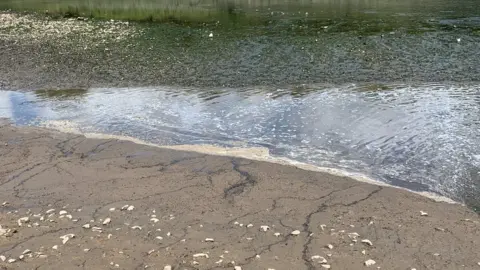
In April, the not-for-profit provider increased its prices to an average bill of £499 a year - the second highest in Wales and England.
NRW's latest annual review, published on Wednesday, found that pollution rose by 7% in 2022, and the number of incidents having a high or significant impact rose from three to five.
Welsh Water also failed to make improvements to the number of incidents self-reported to NRW, falling to 65%, a decrease of 7% from 2021.
Welsh Water released sewage into rivers, lakes and the sea around Wales for nearly 600,000 hours last year, more than 25% of all the hours of discharges into waterways across Wales and England.
NRW's chief executive Clare Pillman called the continued decline in performance "very disappointing".
"Water companies need to take urgent and sustained action to make the changes needed to address the significant pollution incidents we are seeing in our waters."
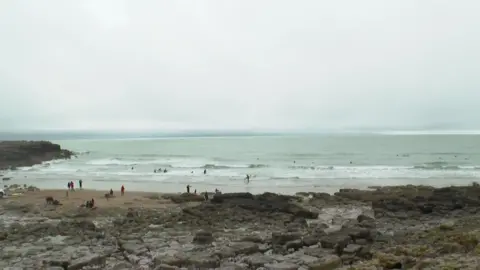
Kim Waters, co-founder of environmental group the Welsh Rivers Union said once again nature in Wales was "taking a hammering".
He said regulators are also to blame for not getting tough with water companies sooner.
"We really shouldn't be in this position," he said.
"Our rivers in Wales, they are dying on their feet, and something's got to change.
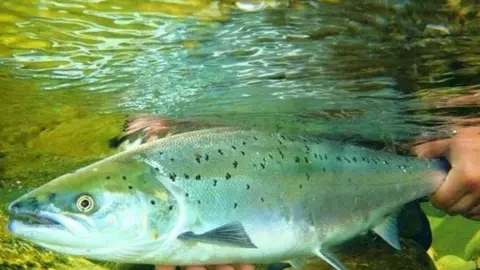
"Some of these rivers that are literally being destroyed are special areas of conservation, they are meant to be highest protected rivers in the whole country.
"This is an appalling state of affairs, a failure of regulation."
Mr Waters said recent concerns about the possible extinction of wild salmon in Welsh rivers will happen given the "current trajectory" of pollution.
In a statement Welsh Water said: "We are working tirelessly to deliver the improvements required in challenging circumstances especially as we experience more severe weather events and extreme variation in the climate.
"These changes are having a significant and increasing impact on our water and wastewater infrastructure and challenging how we deliver our services.
"While we recorded five serious pollution incidents for 2022, compared with three in 2021, we have the second lowest level of total pollution incidents in the water industry, with the number of pollution incidents having halved over the past 10 years.
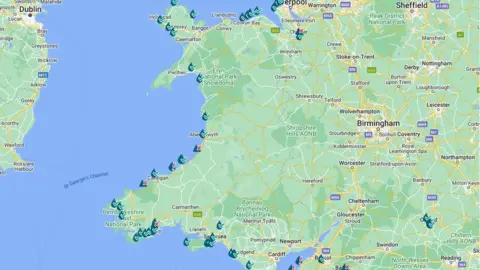 Surfers Against Sewage
Surfers Against Sewage"We are sorry, however, for any environmental harm that we have caused."
The company said it planned to invest an extra £100m to improve river quality by 2025, as part of an £840m improvement plan.
The NRW report found that another water company, Hafren Dyfrdwy, which operates in parts of mid and north east Wales, had "continued good performance on serious pollution incidents with zero serious pollution incidents in 2022" and reduced the total number of pollution incidents from eight in 2021 to four.
